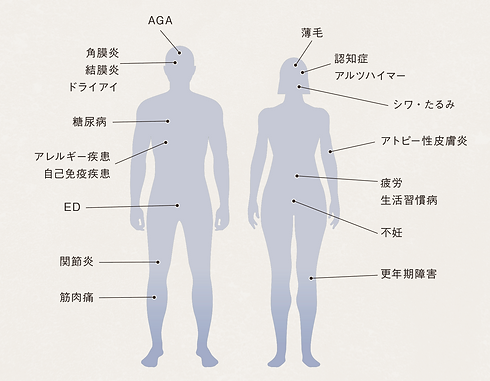
Rejuvenation Program
Transforming Aging into a Treatable Process
At Tokyo Capital Clinic, we offer an iPS Cell Banking service, which involves creating induced pluripotent stem cells (iPS cells) from your own blood and preserving them for long-term storage.
This service is based on cutting-edge medical technology designed to prepare for future healthcare advancements, enabling personalized regenerative treatments with your own cells.
About iPS cells
About iPS cells
iPS cells (induced pluripotent stem cells) are artificially generated pluripotent stem cells created by culturing somatic cells, such as blood or skin cells.
These cells possess two key characteristics:
• Pluripotency – The ability to differentiate into various types of cells, tissues, and organs.
• Self-renewal capacity – The ability to proliferate almost indefinitely.
These unique properties make iPS cells a powerful tool in regenerative medicine, disease modeling, and drug development.


Blood
Skin
Reprogramming

iPS Cells
Self-Renewal Capacity



Pluripotency

Neural Cells
Fibroblasts

Cardiomyocytes
Hepatocytes
Chondrocytes
Pancreatic Cells
Medical Applications
Regenerative Medicine
Drug Discovery Research
Disease Modeling and Research
What is iPS cell Banking?
What is iPS Cell Banking?
iPS cell banking is a technology that involves creating induced pluripotent stem cells (iPS cells) from your own cells and preserving them for future medical treatments or research.
This process allows for personalized regenerative therapies using cells that are fully compatible with your body, minimizing the risks of side effects and immune rejection. By storing iPS cells in advance, patients can access cutting-edge medical treatments as soon as they become available.
Blood Collection


iPS Cells
Creation & Storage
Significance of iPS Cell Banking
Preparation for the Future
The creation of iPS cells is a time-intensive process. If an injury or illness occurs, relying on iPS cells derived from your own body for treatment may delay access to regenerative therapy at the critical moment it is needed.
By proactively generating, processing, and quality-assessing high-grade iPS cells in advance, it becomes possible to quickly produce the necessary cells, tissues, or organs for medical applications when required. This ensures timely access to advanced regenerative treatments.
Realization of Personalized Medicine
By creating iPS cells from your own body and using them for autologous transplantation, treatments can be performed with cells that are fully compatible with your system. This approach significantly reduces the risk of immune rejection and adverse reactions, making completely personalized medicine a reality.
Currently, clinical research using iPS cells for various diseases is advancing. Preemptively creating and storing your own iPS cells allows for seamless access to cutting-edge therapies once they receive regulatory approval, ensuring you can benefit from the latest advancements in regenerative medicine without delay.

Regenerative Medicine with iPS Cell Banks
iPS細胞ストックを用いた再生医療

iPS細胞
神経細胞
網膜細胞
角膜細胞
免疫細胞
心筋細胞
血小板
神経幹細胞
軟骨細胞
膵臓細胞
免疫細胞
パーキンソン病
加齢黄斑変性
網膜色素変性
角膜上皮幹細胞疲弊症
頭頸部がん
卵巣明細胞癌
虚血性心疾患
重症心不全
血小板減少症
亜急性期脊髄損傷
膝関節軟骨損傷
1型糖尿病
血液がん・固形癌

臨床試験:実施中
臨床試験:計画中
Application of iPS cells in regenerative medicine
Application of iPS cells in regenerative medicine
1. Utilization of iPS Cell Culture Supernatant
The culture supernatant obtained during the process of iPS cell cultivation is rich in exosomes and growth factors.
It promotes cell regeneration and repair, contributes to anti-aging, and supports tissue restoration.
Treatments utilizing these components enable rejuvenation at the cellular level.

▲ Diseases and Symptoms Expected to Improve with iPS Cell Culture Supernatant
Key Growth Factors (Cytokines) Contained in iPS Cell Culture Supernatant
HGF
Hepatocyte Growth Factor
Tissue Regeneration
HGF is a cytokine with diverse functions, including cell proliferation promotion, inhibition of cell death, and angiogenesis, playing a crucial role in tissue and organ regeneration and repair.
In the field of aesthetics, it helps retain moisture and oil in the skin, providing firmness and elasticity.
FGF
Fibroblast Growth Factor
Collagen Production Promotion
Prevention of Skin Aging
FGF stimulates and promotes the proliferation of fibroblasts in the dermis.
It enhances the production of collagen, elastin, and hyaluronic acid, contributing to wound healing, wrinkle reduction, and skin brightening.
VEGF
Vascular Endothelial Growth Factor
Hair Growth & Regeneration
VEGF induces cell division and promotes the formation of new blood vessels branching from existing ones.
In hair papilla cells, it improves blood circulation, ensuring the delivery of essential nutrients needed for hair formation and growth.
IGF-1
Insulin-Like Growth Factor-1
Enhances Skin Elasticity
Skin Regeneration & Hair Growth
IGF-1 supports the regeneration of damaged cells, promoting skin cell metabolism and stimulating the production of collagen, elastin, and hyaluronic acid.
KGF
Keratinocyte Growth Factor
Hair Growth & Regeneration
KGF is a type of cytokine that promotes cell division.
It stimulates the proliferation of keratinocytes, which form the foundation of the skin.
By acting on hair follicles, it promotes the formation of stronger hair shafts, leading to thicker and more resilient hair.
TGF-β
Transforming Growth Factor-Beta
Anti-Inflammation & Wound Healing
TGF-β is a multifunctional cytokine that regulates cell proliferation, differentiation, and migration and plays a crucial role in the wound healing process.
It has long been recognized as an immunosuppressive and anti-inflammatory cytokine.
PDGF
Platelet-Derived Growth Factor
Cell Proliferation & Cell Division Promotion
It plays a key role in regulating the migration and proliferation of mesenchymal cells, including smooth muscle cells, connective tissue cells, bone and cartilage cells, and certain blood cells.
EGF
Epidermal Growth Factor
Dark Spot Reduction & Skin Turnover Promotion
EGF helps regulate skin turnover, enhancing the skin’s natural regenerative ability.
By binding to receptors on the skin surface, it promotes cell regeneration.
Increased cell metabolism leads to improved skin appearance, contributing to brighter skin and faster wound healing.
Utilization of iPS Cell Banking
At our clinic, we offer an iPS Cell Banking service, which involves generating induced pluripotent stem (iPS) cells from the member’s own blood and preserving them for an extended period—ranging from five to a maximum of fifteen years.
Additionally, members may place an initial order for 1 to 10 doses of supernatant infusions derived from:
• Autologous iPS cell culture supernatant
• Brown adipocyte culture supernatant
• Dendritic cell culture supernatant
We will propose the most suitable plan tailored to your specific needs.

